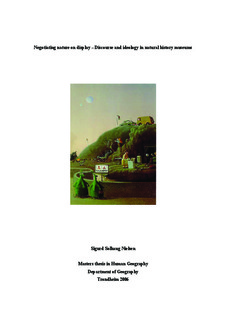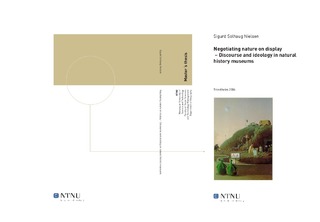| dc.contributor.author | Nielsen, Sigurd Solhaug | nb_NO |
| dc.date.accessioned | 2014-12-19T14:26:37Z | |
| dc.date.available | 2014-12-19T14:26:37Z | |
| dc.date.created | 2014-07-31 | nb_NO |
| dc.date.issued | 2006 | nb_NO |
| dc.identifier | 735749 | nb_NO |
| dc.identifier.uri | http://hdl.handle.net/11250/265587 | |
| dc.description.abstract | This thesis considers exhibitions in natural history museums as a process of negotiation between three parties: the museum as an institution, the museum staff, and the visitors. These represent different interests that shape exhibitions relating to nature. The thesis asks the following main question: In what way do discourses play a role in the staff’s work within natural history museums? The empirical sources are based on interviews conducted with staffmembers from eight different natural history museums: six in Austria and two in Norway. The interviews are analysed based on the principles of discourse psychology and critical discourse analysis. The theoretical framework is based on postmodernism as a reaction and countermovement to modernism. Kant’s theory of knowledge, the concept of representation and discourse theory are considered in relation to one another and form an ontological departure for the epistemology. The methodology combines critical discourse analysis and discourse psychology as applied to conversational text. The discourse analysis reveals different discourses concerning the museum as institution, professional museum staff, and the visitors. The thesis concludes that the museum as institution is characterised by a knowledge culture/tradition that was particularly substantiated during the Enlightenment. In turn, the knowledge tradition is characterised by discourse that places expectations regarding the procedures of the employee, but also through the visitors’ expectations as to what a museumis and what the exhibitions provide them with. The employees meet the museum understood as discourse through mainly three different strategies for how exhibitions should function. I call these strategies ‘action promotion’, ‘communication focus’ and ‘political context’. In this way, the identities and actions of the employees depend considerably on their personal relationship to the museum as a concept and discourse, as well as to the visitors’ presumptions, expectations and experiences concerning museums. | nb_NO |
| dc.description.abstract | Diese Master-Arbeit betrachtet die Ausstellung eines naturgeschichtlichen Museums als Ergebnis eines Verhandlungsprozesses zwischen drei Parteien mit unterschiedlichen Interessen: dem Museumspersonal, dem Museum als Institution sowie dem Publikum. Die Hauptfragestellung der Arbeit lautet: In welcher Weise spielen Diskurse in der Arbeit derwissenschaftlichen Angestellten naturgeschichtlicher Museen eine Rolle? Der theoretische Rahmen der Arbeit basiert auf dem Postmodernismus als einer Reaktion auf und Gegenbewegung zum Modernismus. Kants Erkenntnistheorie, das Konzept der Repräsentation sowie die Diskurstheorie bilden zusammen die ontologische Grundlage der Epistemologie. Die Methodologie kombiniert gesprächsbezogene kritische Diskursanalyse und Diskurspsychologie. Das empirische Material besteht aus Interviews mit wissenschaftlichen Angestellten acht naturgeschichtlicher Museen, davon sechs in Österreich und zwei in Norwegen. Die Diskursanalyse deckt unterschiedliche Diskurse hinsichtlich des Museums als Institution, der wissenschaftlichen Angestellten sowie des Publikums auf. Die Arbeit schlussfolgert, dass das Museum als Institution von einer Wissenskultur gekennzeichnet ist, die insbesondere in der Zeit der Aufklärung begründet ist. Diese Kultur ist insofern diskursgeprägt, als dass sie bestimmte Erwartungen an die Arbeit des Museumspersonals beinhaltet, aber auch durch die Erwartungen des Publikums an ein Museum und seine Ausstellungen. Die Angestellten nähern sich dem Museum als Diskurs, in dem sie hauptsächlich drei verschiedene Strategien im Hinblick auf die Funktion von Ausstellungen verfolgen: Inspiration zu eigenständigem Handeln (”Handlungspromotion”),auf das Publikum zugeschnittene Kommunikation (”Kommunikationsfokus”) sowie Einbeziehung politischen Kontexts. Insofern hängen Identität und Handeln der Angestellten stark von ihrer persönlichen Beziehung zum Museum als Konzept und Diskurs ab, ebenso wie von ihren Annahmen bezüglich der Erwartungen des Publikums und dessen Erfahrungen mit Museen. | nb_NO |
| dc.language | eng | nb_NO |
| dc.publisher | Norges teknisk-naturvitenskapelige universitet, Fakultet for samfunnsvitenskap og teknologiledelse, Geografisk institutt | nb_NO |
| dc.subject | Cultural geography | en_GB |
| dc.subject | museology | en_GB |
| dc.subject | nature | en_GB |
| dc.subject | representation | en_GB |
| dc.subject | critical discourse analysis | en_GB |
| dc.subject | discourse psychology | en_GB |
| dc.subject | semi-structured interview | en_GB |
| dc.subject | natural history museum | en_GB |
| dc.subject | Austrian museums | en_GB |
| dc.subject | Norwegian museums | en_GB |
| dc.subject | enlightenment period | en_GB |
| dc.title | Negotiating nature on display– Discourse and ideology in naturalhistory museums | nb_NO |
| dc.type | Master thesis | nb_NO |
| dc.contributor.department | Norges teknisk-naturvitenskapelige universitet, Fakultet for samfunnsvitenskap og teknologiledelse, Geografisk institutt | nb_NO |

